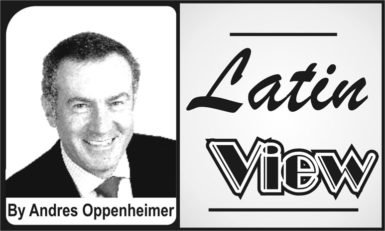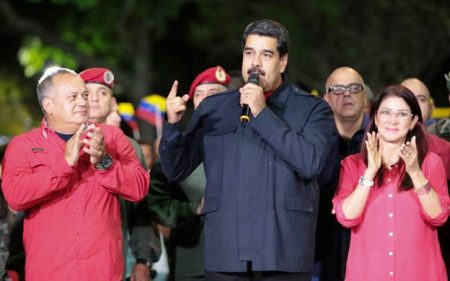In the aftermath of Venezuela’s fraudulent Oct. 15 regional elections, the conventional wisdom is that President Nicolas Maduro has closed all avenues to an electoral solution to the country’s crisis, and that Venezuela will become a new Cuba. It may happen, but there are a few things that suggest otherwise.
 There are many similarities. Maduro is increasingly acting like an all-out dictator, a la Fidel Castro. Maduro’s most recent elections for 23 governorships were so fraudulent that they were denounced by the United States, the 28-member European Union, and Latin America’s biggest countries, including Mexico, Brazil and Argentina.
There are many similarities. Maduro is increasingly acting like an all-out dictator, a la Fidel Castro. Maduro’s most recent elections for 23 governorships were so fraudulent that they were denounced by the United States, the 28-member European Union, and Latin America’s biggest countries, including Mexico, Brazil and Argentina.
It sounds like a joke, but Maduro claims to have won 80 percent of the governorships in a clean election, despite the fact that virtually all polls show that 80 percent of Venezuelans want him to leave office.

In addition to using massive government resources to help his candidates, allowing widespread media censorship and refusing to allow credible international observers, Maduro invalidated more than 1 million opposition votes by preventing people in opposition strongholds from casting their ballots.
He changed the locations of polling places on Election Day, sent voters to remote or dangerous neighbourhoods or failed to inform them where to cast their ballots. Some voters were given ballots that included the names of opposition candidates who had been defeated in primary elections, leading them to cast invalid votes.
Earlier this year, Maduro convened an unconstitutional referendum to elect a parallel congress entirely made up of loyalists. The July 30 referendum outcome was so rigged that the company that ran the voting machines — Smartmatic — publicly suggested a day later that the government had inflated the vote count by at least one million votes.
In other words, Maduro has shown that elections in Venezuela have become, much like in Cuba, irrelevant.
Maduro wins on Election Day by rigging the vote count or cheats in the voting process. Or — as happened with opposition governors and mayors — allows anti-government candidates to win, only to strip them of their duties through government-controlled tribunals later.
In addition, like Cuba in the 1960s, Venezuela has seen a mass exodus, which may intensify after the recent elections. Hundreds of thousands of Venezuelans have already fled to Colombia, Brazil, Panama and the United States, trying to escape the biggest economic collapse in Latin America’s recent history, and a humanitarian crisis that is resulting in widespread food and medicine shortages. Venezuela’s regime, like Cuba’s before, will benefit from the exodus. Maduro may be hoping to get rid of the middle-class and professionals who tend to oppose dictatorships, leaving an easily controlled, docile population of impoverished people who depend on government subsidies.
But that’s pretty much where the similarities with Cuba end. Venezuela is not an island, like Cuba, and this is not the 1960s. Unlike Fidel Castro, Maduro is facing growing international isolation, and can’t expect Russia or China to pour endless funds into its bankrupt economy. Most importantly, unlike many Cubans who have been anesthetized by six decades of living in a police state, Venezuelans have not lost their democratic instincts. Despite 18 years of being bombarded with government propaganda, tens of thousands of people took to the streets earlier this year to protest against Maduro, and more than 150 lost their lives doing that.
Interestingly, as recently exiled El Hatillo Mayor David Smolansky reminded me this week, most of the protesters who died this year were youngsters who in some cases weren’t even born when the late authoritarian demagogue Hugo Chavez took office in 1999.
“If there was anything beautiful in this year’s protests, it was that there is a generation that is fighting for something that it never even knew, which is freedom and democracy,” Smolansky told me. “The 20-year-old kids who were protesting on the streets have never really seen democracy.”
Indeed, whether it’s thanks to Twitter, Facebook or word of mouth, Venezuelans still have deeply ingrained democratic reflexes. Sure, Maduro may have imposed his will in the Oct. 15 vote, but it won’t be easy for him to consolidate a long-term dictatorship like Cuba’s.




